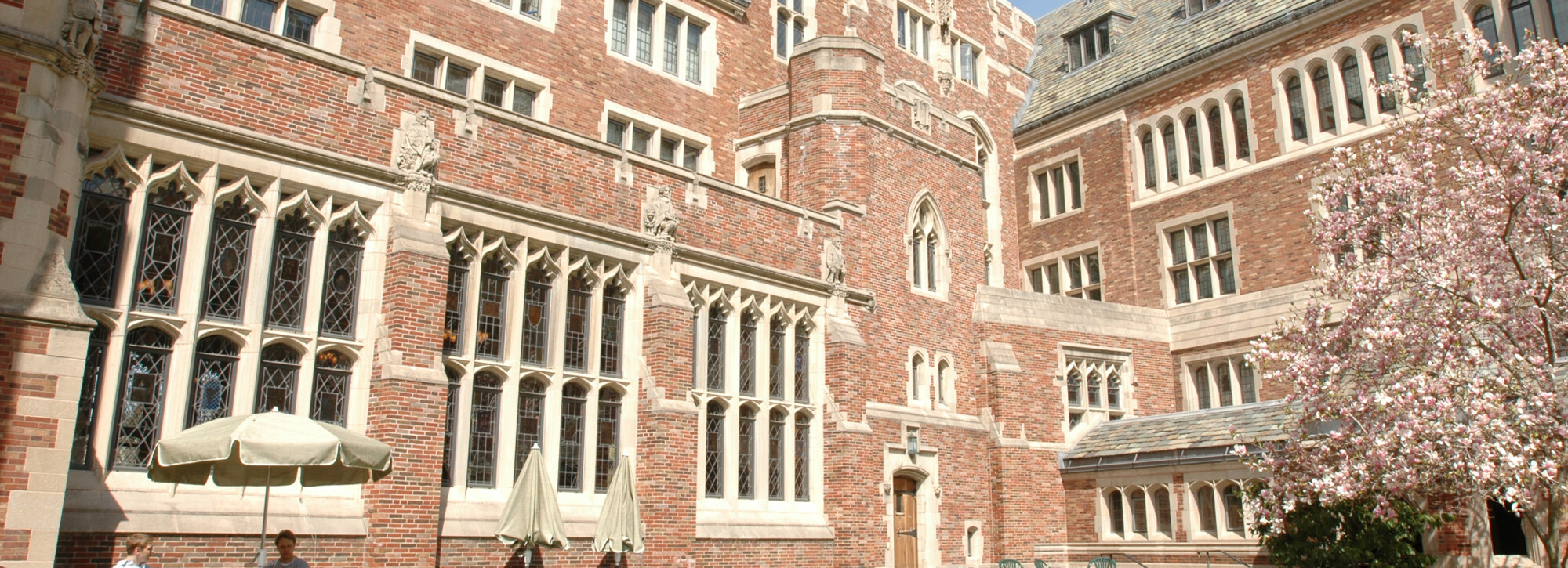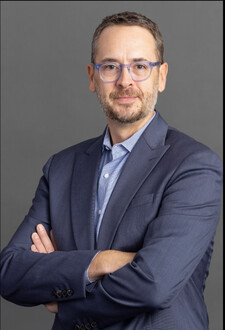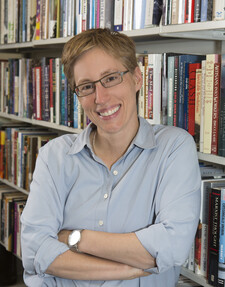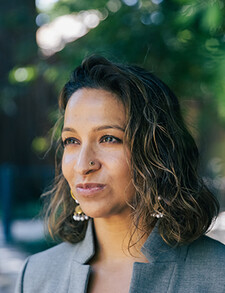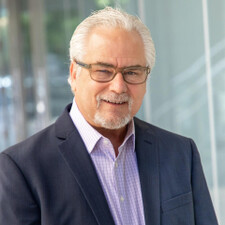Monday, January 27
Brishen Rogers, Law, Georgetown University: Data and Democracy at Work: Advanced Information Technologies, Labor Law, and the New Working Class
Brishen Rogers is a Professor of Law at Georgetown University Law Center, where he teaches labor law, employment law, torts, and various seminars on critical legal theory. He is also a Faculty Advisor to the Disabled Law Students Association. Prof. Rogers’ scholarship focuses on how labor and employment laws shape class formation processes, especially among low-wage and marginalized workers. Prof. Rogers’ book "Data and Democracy at Work" (The MIT Press, 2023) shows how employers have used novel information technologies including robotics, machine learning, and nascent forms of artificial intelligence to erode workers’ collective power, and how our labor laws facilitated such efforts. Prof. Rogers’ is current research explores how worker-organizers’ knowledge of the law has contributed to the recent upsurge in unionization. He is planning a book on that topic. Prof. Rogers’ law review articles have been published in various journals including the Yale Law Journal, Texas Law Review, and Harvard Civil Rights-Civil Liberties Law Review, and have been cited in at least two landmark cases. Professor Rogers has also taught at Temple University Beasley School of Law, as a member of the tenurial faculty, and at Harvard Law School as a Climenko Fellow, and held visiting positions at Washington University in St. Louis and at the European University Institute in Florence, Italy, and was previously an external Fellow at the Roosevelt Institute. Rogers worked in the labor movement both before and after law school, including as part of SEIU’s Justice for Janitors campaign.
Workshop participants should read the Introduction, Chapter Two, and either Chapter 3 or 4 (or both) of Professor Rogers’ recent book: “Data and Democracy at Work: Advanced Information Technologies, Labor Law, and the New Working Class” (MIT Press, 2023).
Monday, February 3
Juliet Schor, Sociology/Economics, Boston College: The Four-Day Week: Evidence from Global Trials of Companies Giving Four Day Weeks with No Reduction in Pay
Juliet Schor is an economist and Professor of Sociology at Boston College. Since 2022 she has been a lead researcher for pathbreaking trials studying hundreds of companies instituting four day, thirty-two hour workweeks with five days’ pay. The research finds large improvements in well-being outcomes and success for the participating organizations. Schor has been researching worktime since the 1980s and is the author of "The Overworked American: The Unexpected Decline of Leisure" (Basic Books, 1992), which was a national bestseller. Schor has also researched sustainable consumption and the link between climate change and worktime, and, since 2011, the platform economy. A graduate of Wesleyan University, Schor received her Ph.D. in economics at the University of Massachusetts. Before joining Boston College, she taught at Harvard University for 17 years in the Department of Economics and later, the Committee on Degrees in Women’s Studies. She is the recipient of numerous awards, and is the 2024 Honorary Fellow of the Society for the Advancement of Socio-Economics, and an Elected Fellow of the AAAS. Her work has been supported by the National Science Foundation, the MacArthur Foundation, the Sloan Foundation and the Russell Sage Foundation, among others. A frequent contributor to public discourse and media, Schor’s Ted Talk on “The Case for the Four Day Week” has more than 3 million views. "Four Days a Week" will be published by Harper Business in June 2025.
Monday, February 10
James D. Nelson, Law, University of Houston: Disestablishment at Work
James Nelson is the Vinson & Elkins Professor at the University of Houston Law Center. His work explores how constitutional norms structure what we tend to think of as private economic arrangements. His current research focuses on rights of speech, religion, and association in the modern workplace.
Workshop participants should read: the Disestablishment at Work (Yale Law Journal, forthcoming 2025).
Monday, February 17
Kevin Woodson, Law, University of Richmond: The Black Ceiling: How Race Still Matters in the Elite Workplace
Kevin Woodson is a Professor of Law at the University of Richmond School of Law. His recent book, "The Black Ceiling: How Race Still Matters in the Elite Workplace" (U. Chicago Press, 2023), addresses challenges that Black professionals experience at elite law firms and other high-status employment settings. Woodson writes and speaks on a range of legal and policy issues including employment discrimination, affirmative action, and racial diversity in higher education and the professions. His scholarship has appeared in Fordham Law Review, Cardozo Law Review, and Stanford Journal of Civil Rights & Civil Liberties, amongst other venues. He is currently working on research projects spanning a variety of topics including the career experiences and perspectives of Black prosecutors, law school affirmative action, homicide reduction as a racial justice issue, and Black progress and contemporary racial disadvantage. Before beginning his academic career, Woodson worked as an associate at the law firm Wilmer Cutler Pickering Hale & Dorr in Washington, D.C. He earned his Ph.D. in sociology and social policy from Princeton University, his J.D. from Yale Law School, and his B.A. from Columbia University.
Workshop participants should read: the Introduction, Chapter 1, Chapter 2, and Chapter 3 of "The Black Ceiling: How Race Still Matters in the Elite Workplace" (University of Chicago Press, November 2023).
Monday, February 24
Alexandra Brodsky, Senior Attorney, Public Justice: Discrimination on The Basis of Consensual Sex
Alexandra Brodsky ’16 is a senior attorney at Public Justice. She specializes in cases challenging sex, sexual orientation, gender identity, and race discrimination in schools, and also litigates suits concerning access to justice, workers’ rights, disability discrimination, and civil rights violations within the criminal legal system. Previously, Brodsky clerked for the Honorable Marsha S. Berzon of the U.S. Court of Appeals for the Ninth Circuit and worked to end discriminatory school push out at the National Women’s Law Center, where she was a Skadden Fellow. Her book "Sexual Justice" was published in 2021.
Workshop participants should read: Discrimination on The Basis of Consensual Sex (New York Law Review Vol. 99 #5, November 2024).
Monday, March 3
Margot Canaday, History, Sexuality, and Women’s Studies, Princeton University: Queer Career
Margot Canaday is Dodge Professor of History at Princeton University. She is the author of "The Straight State: Sexuality and Citizenship in 20th Century America" (Princeton University Press, 2009); and "Queer Career: Sexuality and Work in Modern America" (Princeton University Press, 2023).
Workshop participants should read: Chapter One, Chapter Five, and Chapter Six of "Queer Career: Sexuality and Work in Modern America" (Princeton University Press, January 2023).
Monday, March 10
Hatim A. Rahman, Management and Organization, Kellogg School, Northwestern University: Inside the Invisible Cage: How Algorithms Control Workers
Hatim A. Rahman is an Associate Professor of Management and Organizations and Sociology (by courtesy) at Northwestern University. His research investigates how artificial intelligence, undergirded by algorithms, is impacting the nature of work and employment relationships in organizations and labor markets. This research has been published in Administrative Science Quarterly, Academy of Management Journal, Organization Science, Academy of Management Annals, and Academy of Management Discoveries. His book "Inside the Invisible Cage: How Algorithms Control Workers" (University of California Press) investigates how digital labor platform organizations use shifting, opaque algorithms to control workers' job opportunities. The book provides organizations, workers, and policymakers with insights on how to ensure the future of work has more equitable, mutually beneficial outcomes. Professor Rahman’s research and teaching have received numerous awards, including the National Science Foundation CAREER award. In 2023, he was named as one of the best 40 business school professors under 40 years of age by Poets & Quants.
Workshop participants should read: Chapter One, Chapter Four, Chapter Seven, and Chapter Eight of "Inside the Invisible Cage How Algorithms Control Workers" (University of California Press, forthcoming 2025)
Monday, March 24
Diana S. Reddy, Law, University of California Berkeley Law: Discrimination as Exploitation
Diana is a law professor and the Faculty Co-Director for the Center for Law and Work at the University of California, Berkeley School of Law, where she teaches courses about the regulation of work, the role of labor unions in American democracy, and the relationship between economic justice and civil rights. Her scholarship has been published or is forthcoming in the Yale Law Journal, the Columbia Law Review, and the Emory Law Journal, among others, and her shorter commentary can be found in outlets like the LPE Blog, the ACS Expert Forum, the Drift, and Power at Work. Diana is also a Research Fellow with the Roosevelt Institute’s Worker Power and Economic Security Program. Prior to entering legal academia, Diana was a litigator, representing labor unions and workers at the AFL-CIO, Altshuler Berzon LLP, and the California Teachers Association. She has a Ph.D. in Jurisprudence and Social Policy from UC Berkeley, and received her law degree, magna cum laude, from NYU School of Law, where she was a Root Tilden Kern Scholar. After law school, Diana clerked for Judge Kimba Wood of the Southern District of New York and Judge Theodore McKee of the Third Circuit Court of Appeals. Diana sits on the editorial board of the Journal of Law and Political Economy, serves as an expert speaker on labor issues and economic inequality for the LPE Project, and is an advisor to several workers’ centers and nonprofits.
Workshop participants should read: Discrimination as Exploitation.
Monday, March 31
Michael Selmi, Law, Arizona State University: Diversity, Equity and Inclusion and the Private Workplace
Mike Selmi is the Foundation Professor of Law and Mary Sigler Fellow at Arizona State College of Law. He was previously on the faculty at George Washington University and the University of North Carolina after spending time litigating employment discrimination cases for the government and the Lawyers' Committee for Civil Rights. Professor Selmi writes on employment discrimination, employment law and civil rights, has published more than sixty articles and is a co-author on three casebooks. Currently Professor Selmi is working on projects relating to the permissibility of Diversity, Equity and Inclusions efforts in the private workplace as well as broader questions relating to our failure to make more progress towards equality.
Monday, April 7
Veena Dubal, Law, University of California Irvine: Myths & Measurement in the Digital Wage Setting
Professor Veena Dubal’s research focuses broadly on law, technology, and precarious workers, combining legal and empirical analysis to explore issues of labor and inequality. Her work encompasses a range of topics, including the impact of digital technologies and emerging legal frameworks on workers' lives, the interplay between law, work, and identity, and the role of law and lawyers in solidarity movements. Professor Dubal has written numerous articles in top law and social science journals and publishes essays in the popular press. Her research has been cited internationally in legal decisions, including by the California Supreme Court, and her research, writing, and commentary are regularly featured in media outlets, including The New York Times, The Washington Post, The Wall Street Journal, The Los Angeles Times, NPR, CNN, etc. TechCrunch has called Prof. Dubal an “unlikely star in the tech world,” and her expertise is frequently sought by regulatory bodies, legislators, judges, workers, and unions in the U.S. and Europe. Professor Dubal is completing a book manuscript that presents a theoretical reappraisal of how low-income immigrant and racial minority workers experience and respond to shifting technologies and regulatory regimes. The manuscript draws upon a decade of interdisciplinary ethnographic research on taxi and ride-hail regulations and worker organizing and advocacy in San Francisco.
Monday, April 14
Valerio De Stefano, Law, York University: Worker Subordination and the Future of Remote Work
Valerio De Stefano, PhD, is a Full Professor of Law at Osgoode Hall Law School (Toronto) and holds the Canada Research Chair in Innovation, Law and Society. Previously, he served as BOFZAP Professor of Labour Law at the KU Leuven and as an officer of the International Labour Organization. His work focuses on platform work, AI, and labour protection, with numerous publications and contributions to policy discussions. He has received various research grants and awards, and his work has been cited by courts, regulators and media worldwide. He is the General Editor of the Comparative Labor Law & Policy Journal.
